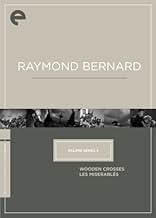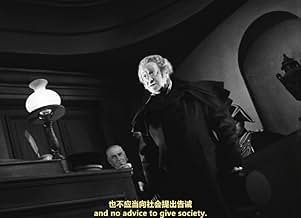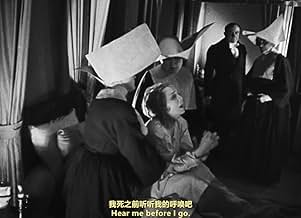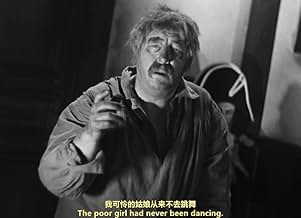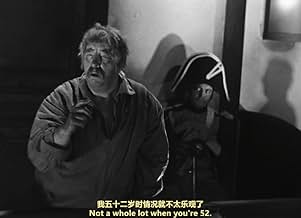Narra las vidas de numerosas personas a lo largo de veinte años en la Francia del siglo XIX, entretejidas por la historia del exconvicto Jean Valjean que huye de un inspector de policía obse... Leer todoNarra las vidas de numerosas personas a lo largo de veinte años en la Francia del siglo XIX, entretejidas por la historia del exconvicto Jean Valjean que huye de un inspector de policía obsesivo que lo persigue solo por un delito menor.Narra las vidas de numerosas personas a lo largo de veinte años en la Francia del siglo XIX, entretejidas por la historia del exconvicto Jean Valjean que huye de un inspector de policía obsesivo que lo persigue solo por un delito menor.
- Dirección
- Guión
- Reparto principal
- Premios
- 1 premio en total
- Félix Tholomiez
- (sin acreditar)
Reseñas destacadas
People interested in his Hugo adaptation (and they are numerous) should try and watch other works : a prolific director,he made forgettable movies (like everybody else) but "Cavalcade d'Amour " (1939) which tells three love stories in the same place but at different times;"Un Ami Viendra Ce Soir" a curious movie about the French Resistance - which might have inspired De Broca for his highly praised "Le Roi De Coeur ";"Le Jugement De Dieu" , a brilliant melodrama in the Middle Ages poorly remade later as a sketch of "Les Amours Célèbres with B. Bardot and A.Delon;a black comedy " Le Septième Ciel" ,all these movies worth seeking out;there's also a silent version of "Le Miracle Des Loups "(1924),later remade by André Hunebelle in the sixties.
Forgive me for this long introduction,but it's really a pity this director should be ignored even in his native country (among the many comments,how many come from French users?).
In the thirties ,it was a titanic task,actually an equivalent of Gance's "Napoleon" of the twenties;it's the only French thirties work which features three parts :at the time,in Paris, it was possible to see the whole in one day,for the theaters did not show the same film;later on,with the staggering exception of "Les Enfants Du Paris" ,the two-part movies (such as "Le Comte De Monte Cristo" and Le Chanois's much inferior own "Miserables" ) were released several months apart.
The male cast is close to perfect:Harry Baur is considered one of best French actors of all time ,the extraordinary lead of Duvivier's first talkie "David Golder "and was made to portray Valjean ;his restrained but highly intense acting works wonders in the scene with bishop Myriel and in all his scenes with Javert played by the always reliable Charles Vanel ,the only French actor enjoying 2 movies in the IMDb top 250- 'Le Salaire De La Peur " and "Les Diaboliques" - by the way!matching them all along the way is Charles Dullin - a great stage actor whose portraying of Molière's Harpagon has remained memorable-as Thénardier ,with his face ravaged by greed;Jean Servais the French audience mainly remembers for his later parts and often forgets there was a time when he was young,and he is a very good Marius.
On the other hand,the female parts are more uneven ;Florelle as Fantine is deeply moving ,the destitution's child who endures the unwed mother's fate;the great Marguerite Moreno shines as La Thénardier ,the actress was as convincing as a shrew as she was as a Grande dame;Pagnol's Orane Demazis is less talented as Eponine although she fortunately forgets her Provençal accent and has a good final scene (the part was intended for Arletty ) ;as for the forgotten actress who plays Cosette,she is totally bland (the part was intended for Danielle Darrieux)
Although Waterloo is not included -represented here by a painting and some Thénardier's lines- there are imposing scenes on the barricades ,and the death of Gavroche ("this little soul had flown away") is really moving,with a young actor with more screen presence than his sister;more intimate scenes such as these with bishop Myriel go straight to the heart ;and "the tempest in the skull" shows Bernard's virtuosity ,here in a league with Abel Gance .
Neither Le Chanois's nor Hossein's versions ,let alone American effort starring Liam Neeson can hold a candle to Bernard's Magnum Opus.
Historical note: The creepy night scene where Cosette is sent, despite her fears, to fetch water a long way from home at the request of her heartless keepers, is a direct inspiration for Walt Disney's Snow White's panicky flight through the forest scene of three years later (1937).
May 2008 update: As most of you probably know, the whole film is now available on DVD from Criterion's Eclipse series in Region 1.
¿Sabías que...?
- CuriosidadesRe-released in France in 1951.
- PifiasIn the second part, Les Thenardier, when Jean Servais overhears the pair plotting to rob Valjean, Raymond Bernard can be heard softly directing him to leave the room ("Vite!").
- Citas
Cosette: [as she and Valjean witness a convoy of convicts being taken to the penal colonies] But father... are they... still human?
Jean Valjean: Sometimes.
- ConexionesFeatured in Testigo de excepción (1995)
Selecciones populares
Detalles
- Duración4 horas 39 minutos
- Color
- Relación de aspecto
- 1.37 : 1
Contribuir a esta página


